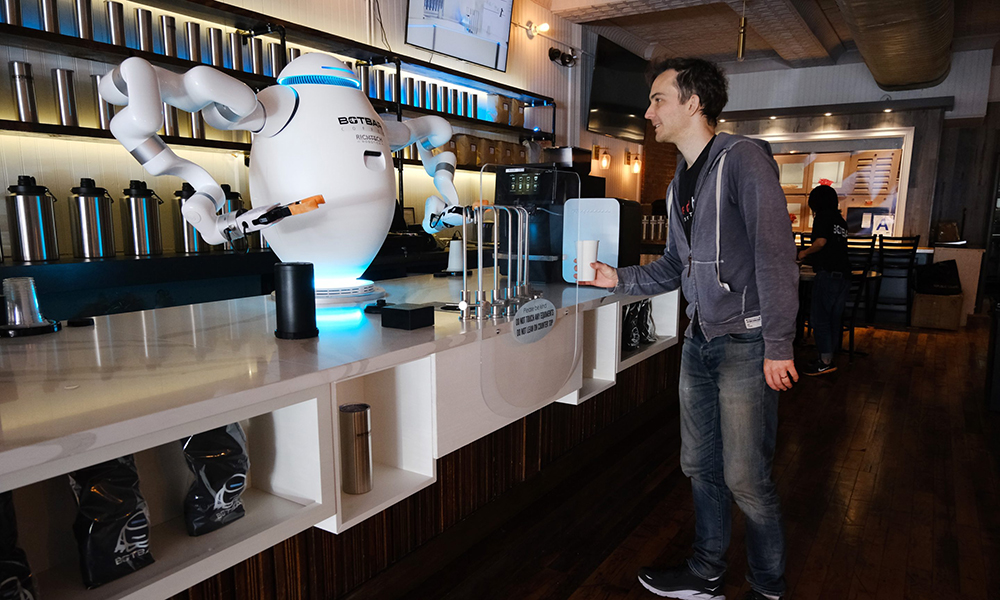
千禧一代和Z世代見證了對他們曾祖輩來說只存在于科幻小說中的科技進步,包括iPhone手機的誕生和自動駕駛汽車的面世,但A世代的境遇甚至可能更加超乎前人的想象。
由股票策略師馬丁·布里格斯(Martyn Briggs)領導的美國銀行研究(Bank of America Research)的分析師團隊周二解釋道,人工智能(AI)的崛起是“一個更具革新性的iPhone時刻”,在未來幾十年內將不僅重塑商界和全球經濟,還會改變整整一代人。
A世代一般是指2012年至2020年代中期出生的人口,他們將在這樣一種“常態”中長大:AI助手與孩子一起學習和成長,并逐漸調整功能以適應他們的具體需求。
周四,布里格斯及其團隊在一份報告中總結了最近14場AI專家活動的重要啟示,并寫道:“我們正處在‘A世代’人口變革的初期。作為出生于網絡世界的第一代人,Z世代是目前最具顛覆性的一代;但今天的孩子們卻將會在AI模型的陪伴下成長。”
分析師們引用了Alphabet旗下研究與開發機構X(原為GoogleX)的顧問蒂莫西?帕潘德里歐(Timothy Papandreou)的言論,他在不久前舉辦的一場活動中表示,隨著孩子們在人生過程中學會使用生成式AI“助手”,AI將推動程序員一代向“最佳提示者”一代轉變。
未來,A世代將不再需要掌握編程技能來使用他們的AI模型,而只需設法通過輸入簡單的文本來適當地提示這些系統,以獲得理想的結果,無論是在為了完成學校論文而查找關于小說家卡夫卡的資料,還是書寫工作郵件的時候。
帕潘德里歐表示,“如今,孩子們從出生起就會有一個AI虛擬隨身助理或經紀人。在孩子們長大的過程中,AI也會隨之成熟,掌握一切必要的信息,并且一直以導師的角色相伴他們左右”,并稱Z世代將是“最后一代沒有AI陪伴著長大的人”。
如《財富》雜志之前報道,作為生于互聯網和社交媒體時代的第一代人,Z世代一直在忙著對抗焦慮和努力尋找自身的意義。如今,該輪到A世代應對科技快速發展的影響了,他們對AI的使用很可能將引起一系列新的、始料未及的心理健康問題。
企業與監管機構面對的新世界
美國銀行(Bank of America)的分析師詳細闡明了A世代對AI的使用最終將如何重塑商界以及為何需要政府的嚴格監管以防止最壞的情況發生。他們指出,年輕一代已經開始接受AI,并稱“以ChatGPT和Bard為例,年輕一代更加了解它們,也以更為贊許的態度看待它們。”
在過去一年的14場AI活動上,接受美國銀行采訪的專家們表示:總之,作為精通AI的第一代人,A世代的崛起意味著企業亟需快速過渡到應用AI技術的階段。
未來主義者、奇點大學(Singularity University)聯合創始人彼得?迪曼蒂斯(Peter Diamandis)對該投資銀行直言不諱道:“到這個十年結束時,將會有兩種公司:一種是充分利用AI的公司,另一種是破產的公司。”
對政府來說,隨著A世代日漸成熟,AI顯現出巨大的風險。專家一再警告AI對勞動力市場構成潛在影響,但相比造成失業,美國銀行的分析師更擔心AI引發深度偽造、虛假宣傳及侵犯版權和知識產權等問題。他們表示,未來將需要借助“AI管理員”(監督AI模型的人類程序員和監管者)來抵抗這些消極影響。
他們寫道:“對AI實施監管的日子即將到來。為了解決利用AI進行虛假宣傳和傳播假新聞的問題,我們需要監管,尤其是要制定原則、標準以及搭建防護欄。”
美國銀行還與AI倫理學家及歐洲負責任人工智能辦公室(European Responsible Artificial Intelligence Office)主任內爾·沃森(Nell Watson)就未來法規將演變成怎樣進行了探討。后者表示,將“不大可能”形成全球性的AI監管框架,但旨在防止最壞情況的各種策略正陸續推出。
她解釋道:“每個地區的目標都是進行‘恰到好處’的干預,但采取的辦法各不相同,其中有監測和管控(中國)、國家安全限制/硬件限制(美國)以及實施隱私法(歐盟)。”
沃森說,“迄今為止,公司的AI道德意識和自我監管尚不足且水平參差不齊”,不過也不應該因為“道德恐慌”就過度監管新技術。
她表示:“我們的分寸應拿捏得當,做到確保足夠的安全性以防止引發災難性事件和不良的外部效應,但又不會完全阻礙AI的發展。”(財富中文網)
譯者:中慧言-劉嘉歡
千禧一代和Z世代見證了對他們曾祖輩來說只存在于科幻小說中的科技進步,包括iPhone手機的誕生和自動駕駛汽車的面世,但A世代的境遇甚至可能更加超乎前人的想象。
由股票策略師馬丁·布里格斯(Martyn Briggs)領導的美國銀行研究(Bank of America Research)的分析師團隊周二解釋道,人工智能(AI)的崛起是“一個更具革新性的iPhone時刻”,在未來幾十年內將不僅重塑商界和全球經濟,還會改變整整一代人。
A世代一般是指2012年至2020年代中期出生的人口,他們將在這樣一種“常態”中長大:AI助手與孩子一起學習和成長,并逐漸調整功能以適應他們的具體需求。
周四,布里格斯及其團隊在一份報告中總結了最近14場AI專家活動的重要啟示,并寫道:“我們正處在‘A世代’人口變革的初期。作為出生于網絡世界的第一代人,Z世代是目前最具顛覆性的一代;但今天的孩子們卻將會在AI模型的陪伴下成長。”
分析師們引用了Alphabet旗下研究與開發機構X(原為GoogleX)的顧問蒂莫西?帕潘德里歐(Timothy Papandreou)的言論,他在不久前舉辦的一場活動中表示,隨著孩子們在人生過程中學會使用生成式AI“助手”,AI將推動程序員一代向“最佳提示者”一代轉變。
未來,A世代將不再需要掌握編程技能來使用他們的AI模型,而只需設法通過輸入簡單的文本來適當地提示這些系統,以獲得理想的結果,無論是在為了完成學校論文而查找關于小說家卡夫卡的資料,還是書寫工作郵件的時候。
帕潘德里歐表示,“如今,孩子們從出生起就會有一個AI虛擬隨身助理或經紀人。在孩子們長大的過程中,AI也會隨之成熟,掌握一切必要的信息,并且一直以導師的角色相伴他們左右”,并稱Z世代將是“最后一代沒有AI陪伴著長大的人”。
如《財富》雜志之前報道,作為生于互聯網和社交媒體時代的第一代人,Z世代一直在忙著對抗焦慮和努力尋找自身的意義。如今,該輪到A世代應對科技快速發展的影響了,他們對AI的使用很可能將引起一系列新的、始料未及的心理健康問題。
企業與監管機構面對的新世界
美國銀行(Bank of America)的分析師詳細闡明了A世代對AI的使用最終將如何重塑商界以及為何需要政府的嚴格監管以防止最壞的情況發生。他們指出,年輕一代已經開始接受AI,并稱“以ChatGPT和Bard為例,年輕一代更加了解它們,也以更為贊許的態度看待它們。”
在過去一年的14場AI活動上,接受美國銀行采訪的專家們表示:總之,作為精通AI的第一代人,A世代的崛起意味著企業亟需快速過渡到應用AI技術的階段。
未來主義者、奇點大學(Singularity University)聯合創始人彼得?迪曼蒂斯(Peter Diamandis)對該投資銀行直言不諱道:“到這個十年結束時,將會有兩種公司:一種是充分利用AI的公司,另一種是破產的公司。”
對政府來說,隨著A世代日漸成熟,AI顯現出巨大的風險。專家一再警告AI對勞動力市場構成潛在影響,但相比造成失業,美國銀行的分析師更擔心AI引發深度偽造、虛假宣傳及侵犯版權和知識產權等問題。他們表示,未來將需要借助“AI管理員”(監督AI模型的人類程序員和監管者)來抵抗這些消極影響。
他們寫道:“對AI實施監管的日子即將到來。為了解決利用AI進行虛假宣傳和傳播假新聞的問題,我們需要監管,尤其是要制定原則、標準以及搭建防護欄。”
美國銀行還與AI倫理學家及歐洲負責任人工智能辦公室(European Responsible Artificial Intelligence Office)主任內爾·沃森(Nell Watson)就未來法規將演變成怎樣進行了探討。后者表示,將“不大可能”形成全球性的AI監管框架,但旨在防止最壞情況的各種策略正陸續推出。
她解釋道:“每個地區的目標都是進行‘恰到好處’的干預,但采取的辦法各不相同,其中有監測和管控(中國)、國家安全限制/硬件限制(美國)以及實施隱私法(歐盟)。”
沃森說,“迄今為止,公司的AI道德意識和自我監管尚不足且水平參差不齊”,不過也不應該因為“道德恐慌”就過度監管新技術。
她表示:“我們的分寸應拿捏得當,做到確保足夠的安全性以防止引發災難性事件和不良的外部效應,但又不會完全阻礙AI的發展。”(財富中文網)
譯者:中慧言-劉嘉歡
Millennials and Gen Z have witnessed technological advancements their great grandparents would have seen as science fiction, from the birth of the iPhone to the rollout of self-driving cars, but Gen A’s story might be even more Asimov-esque.
Bank of America Research analysts, led by equity strategist Martyn Briggs, explained Thursday that the rise of A.I. is “an iPhone moment, on steroids” that will reshape not only the business world and the global economy over the coming decades, but also an entire generation.
Gen A, generally defined as those born between 2012 and the mid-2020s, will grow up in a world where “the norm” will be A.I. assistants that learn and grow alongside children, slowly being tailored to their specific needs.
“We are at the dawn of a demographic ‘Gen A’ revolution,” Briggs and his team wrote in a Thursday note summarizing the key takeaways from 14 recent A.I. expert events. “While Gen Z is the most disruptive generation now as the first generation to be born into an online world; kids of today will have AI models that grow with them.”
The analysts cited Timothy Papandreou, an advisor to Alphabet’s research and development organization, X (formerly GoogleX), who explained at a recent event that A.I. will lead to a transition from a generation of programmers to a generation of “perfect prompters” as kids learn to utilize generative A.I. “assistants” throughout their lives.
Gen A won’t need programming skills to use their A.I models, instead they will work to properly prompt these systems with simple text to get the desired outcome, whether that’s finding information about Kafka for a school paper or writing an email at work.
“Children will now have an A.I. avatar shadow assistant or agent from birth. As they grow A.I. will grow with them and know everything it needs to know, and always be there as a mentor,” Papandreou said, arguing that Gen Z will be the “last generation to not grow up with AI.”
As Fortune previously reported, Gen Z has grappled with anxiety and finding meaning in their role as the first generation born with the internet and social media. Now, it’s Gen A’s turn to deal with the impact of rapid technological advancement, and their A.I. usage will likely bring forward a whole new set of unforeseen mental health problems.
A new world for businesses and regulators
Bank of America’s analysts detailed how Gen A’s use of A.I. will ultimately reshape the business world and require serious regulation from governments to prevent worst-case scenarios. They argued that younger generations are already leaning into A.I, noting that “in the case of ChatGPT and Bard, younger generations are more aware of them and see them in a more favourable light.”
In sum, the rise of the first A.I.-fluent generation, Gen A, means a rapid transition to using the technology is necessary for businesses, according to the experts BofA interviewed throughout 14 separate A.I. events over the past year.
“There will be two kinds of companies at the end of this decade: those that are fully utilizing AI, and those that are out of business,” Peter Diamandis, a futurist and the co-founder of Singularity University, bluntly told the investment bank.
For governments, the risks of A.I. are significant as Gen A comes of age. Experts have repeatedly warned about the potential impact of A.I. on the labor market, but BofA’s analysts are less concerned about job losses and more worried about the rise of deepfakes, propaganda, and copyright and intellectual property issues. They said there will need to be “AI Wranglers”—human programmers and regulators who oversee A.I. models—to help counteract these negative effects in the future.
“A.I. regulation is on the horizon,” they wrote. “To address the problems of propaganda and fake news, we need regulation, especially principles, standards and guardrails.”
BofA also spoke with Nell Watson, an A.I. ethicist and the president of the European Responsible Artificial Intelligence Office, about how future regulations might look. She said a global framework for regulating A.I. is “unlikely,” but different strategies to prevent worst-case scenarios are rolling out now.
“Each region is targeting a ‘Goldilocks level’ of just right intervention but taking different approaches, from surveillance and control (China), national security/hardware restrictions (US), to privacy laws (EU),” she explained.
Watson said that “company A.I. ethics and self-regulation are insufficient and uneven thus far,” but the new technology shouldn’t be overregulated due to “moral panic” either.
“We should do just enough and not more, to have enough safety to prevent catastrophe and prevent unfortunate externalities, but not shut down A.I. altogether,” she argued.






